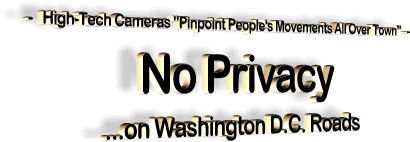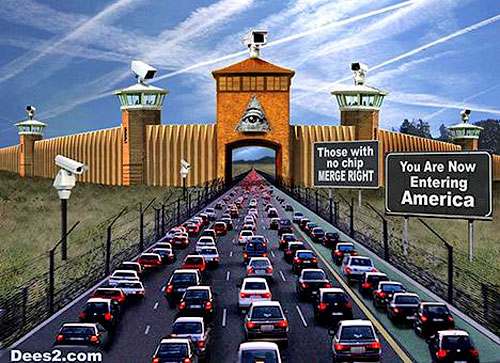
November 22, 2011
from
ActivistPost Website

Since the pilot program began in 2004, hundreds of high-tech,
license-plate-reading cameras have been deployed in the
District of Columbia (D.C.) area that can
archive and,
"pinpoint people’s movements all over town."
The Washington Post
reports that,
"More than 250 cameras in the District and
its suburbs scan license plates in real time," making it the highest
concentration of these big brother tools in the nation with one camera
per square mile.
At a cost to the taxpayer of $20,000 per camera,
they are said to be able to capture license,
"numbers across four lanes of traffic on
cars zooming up to 150 mph," collecting around 1,800 images a minute and
over 1 million data points per month.
Sgt. Robert Alessi, of the Virginia State
Police, said the,
“Fixed cameras will help us use a net
instead of one fishing pole with one line in the water waiting to get a
nibble.”
Authorities claim that they have been helpful in
finding stolen cars faster, tracking down killers and, in some cases,
adulterers.
However, there has been essentially no public
debate or even disclosure about this,
"vast system that tracks the comings and
goings of anyone driving around the District."
“The government has no business collecting that kind of information on
people without a warrant,” said Jay Stanley, of the ACLU’s technology
and liberty program.
While the U.S. Supreme Court is reviewing the
constitutionality of police using GPS surveillance without warrants, this
new technology has yet to even be discussed seven years after its initial
launch.
“It’s big brother,” said Orin Kerr, a law
professor at George Washington University. “This technology could be
used for good and it could be used for bad. I think we need a
conversation about whether and how this technology is used.”
The concerns about privacy arise due to the
sophistication of the technology; operators can take a picture of every
license plate that passes by and instantly analyze them against a database,
determining where any vehicle has been and when.
"Detectives also can enter a
be-on-the-lookout into the database, and the moment that license plate
passes a detector, they get an alert."
These Big Brother devices are not limited to the
Washington D.C. area and are expanding to nearly every corner of America. It
makes one wonder how long it will be until these real-time cameras also
contain facial recognition technology.
Of course, the same motto is rolled out anytime technology seems to infringe
on privacy:
“If you’re not doing anything wrong, you’re
not driving a stolen car, you’re not committing a crime, then you don’t
have anything to worry about,” espoused Sgt. Robert Alessi.

